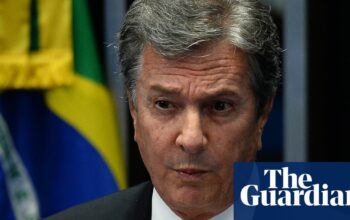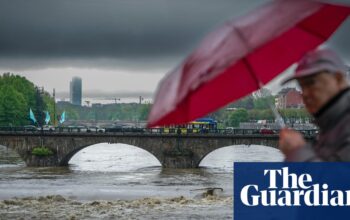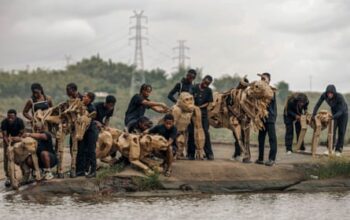South Africa is facing the uncertain possibility of a coalition government after the former president Jacob Zuma’s new party upended the country’s elections, contributing to the African National Congress party’s vote share collapsing well below half, with 97% of voting stations counted.
By Saturday, the ANC, which has governed South Africa with a large majority since Nelson Mandela led it to power 30 years ago after the end of apartheid, had 40.14% of the vote.
If the final results are similar, that would represent a decline of more than 15 percentage points from the 2019 elections, and suggest voters have punished the former liberation movement for chronic unemployment, rolling power cuts and crumbling infrastructure.
The business-friendly Democratic Alliance (DA) was on 21.7% of the vote, while Zuma’s uMkhonto we Sizwe (MK) party, which was launched only in December and supports nationalising banks and expropriating land without compensation, was on 14.8%.
Earlier, in KwaZulu-Natal (KZN), South Africa’s second most populous province and the 82-year-old Zuma’s base, the MK had 43.6% of the vote with just 57% of voting stations counted by late afternoon on Thursday. That was more than double any other party. It also took votes from the far-left Economic Freedom Fighters (EFF), which was founded by the firebrand former ANC youth leader Julius Malema and looked likely to underperform its 2019 vote share of 10.8%.
The Council for Scientific and Industrial Research, a government-owned research organisation, projected earlier on Thursday that the ANC’s vote share would fall to 40.5%, with the DA on 21.7% and the MK on 14.6%.
The election deals a huge blow to the ANC, which forced Zuma to resign as South Africa’s president in 2018 after a series of corruption allegations, which he denies. While the ANC is expected to remain the largest party by some margin, it will probably have to take at least one large coalition partner – and to decide quickly, as the constitution says the new parliament must sit within 14 days of results being declared and elect a new president at that sitting.
“This puts the ANC in a really big bind, because there’s two factions in the ANC,” said Marisa Lourenço, a political analyst. “You’ve got your more leftist one that is still quite pro Zuma … and then you’ve got the more pro-business centre-right faction of the ANC, which is led by [the current president, Cyril] Ramaphosa.”
That faction is likely to favour a coalition with the DA, but probably will not currently have the upper hand, she said.
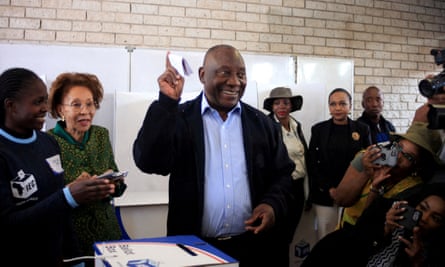
The EFF could be favoured as a coalition partner by the ANC’s more leftwing faction, analysts said. Their policies, many similar to those of the MK, of nationalising businesses and redistributing white-owned land, are likely to be anathema to Ramaphosa’s camp as well as to businesses and investors.
The ANC may seek a coalition with the DA, but would probably want to include another, smaller black-led party, said Melanie Verwoerd, a former ANC MP who is now a political analyst.
“[This is] because the DA is a white-led party and it’s very much perceived as a white party, with very market-oriented policies, which is not always popular with the majority of people in South Africa,” said Verwoerd, who was also previously South Africa’s ambassador to Ireland.
The initial results mean the ruling party faces questions about the future of Ramaphosa, with whom Zuma has a bitter feud.
A senior ANC official dismissed the idea that Ramaphosa’s position was under threat. “Nobody is going to resign,” Nomvula Mokonyane told journalists at the election results centre. “Collectively, all of us, we still are confident that he [Ramaphosa] has to remain the president of the ANC.”
She said the ANC was not currently talking to any parties about a possible coalition.
The DA leader, John Steenhuisen, asked about the possibility of joining a coalition, said his party would first talk to members of the Multi-Party Charter, a pre-election alliance whose members collectively have about 29% of the votes counted so far.
If they are not able to form a majority, Steenhuisen said he wanted to prevent what he has long labelled a “Doomsday coalition” that includes the ANC, MK and EFF. “We saw what happened in Zimbabwe,” he said.
The EFF officials did not make anyone available to interview, despite repeated requests at the results centre.
Dudu Zuma-Sambudla, one of Zuma’s daughters, expressed her happiness with the election results, even though they did not achieve their stated aim of a two-thirds parliamentary majority, which would have enabled the party to overturn the constitution and enshrine parliamentary supremacy. Zuma himself was barred from standing in the elections because of a 2021 prison sentence for contempt of court.
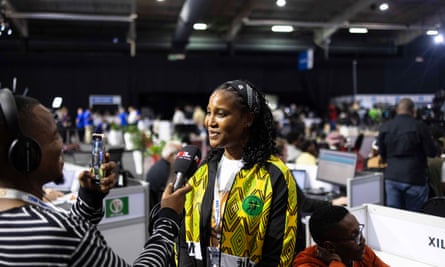
“I’m excited about it and the MK is also pretty pleased,” said Zuma-Sambudla. If the MK does not reach a majority in KZN, it will hope to form a coalition with “black progressive parties”, she said, reiterating the party’s opposition to working with the ANC under Ramaphosa’s leadership at a national level.
A judicial inquiry alleged that Zuma fired competent officials, appointed loyal ministers and influenced the awarding of large contracts during his presidency, in order to benefit the Indian businessmen brothers Atul, Ajay and Rajesh Gupta, a scandal that became known as “state capture”. He is also due to go on trial next year on charges that he took bribes from the French arms manufacturer Thales in 1999.
Zulu nationalism explains a big part of Zuma’s enduring appeal to his supporters, said Kealeboga Maphunye, a professor of African politics at the University of South Africa.“These are the ones who believe that there’s nothing that he has done, that these scandals are concocted, they are political gimmicks to undermine him and to get rid of him,” he said.
Meanwhile, although the votes are still being counted, national and provincial coalition negotiations will already have begun behind closed doors, said Maphunye. “We have already begun the give and take and political bartering.”
Source: theguardian.com
